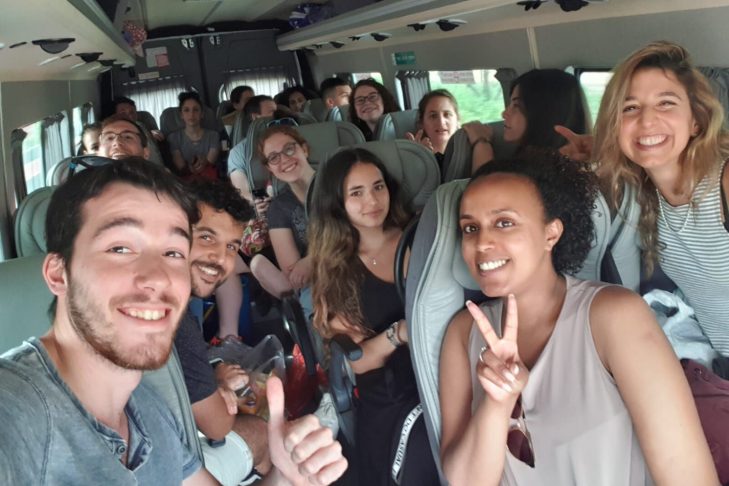ConnecTech is a year-long fellowship for MIT and Technion Jewish students. The primary focus is on student interaction—creating personal bonds between small core groups of students at each institute and strengthening a sense of Jewish peoplehood. For more information or to read our Fellows’ bios, visit our website.
On Friday morning, we walked in Wadi Nisnas, an Arab neighborhood in Haifa, on a tour through Beit HaGefen, a community center, theater and art gallery focused on intercultural interactions between Arabs, Jews and other communities in Haifa. The streets of the Wadi are peppered with public art installations, in most cases created by local artists. We visited and discussed a number of these pieces, and I would like to share my favorite example.
On our tour, we walked up from the street into a narrow, cobbled alley until we reached an intersection with another alleyway, which ran adjacent to a house surrounded by what appeared to be junk—floor tiles stacked high and close to a hundred doors leaning against a wall. This is the home of a local artist, a neighborhood icon. At eye level, there is nothing notable to see in the vicinity, but our guide directed our eyes upward. Hanging from a wall high above us is a curious piece of art. It consists of a table set with a traditional pot and cups for drinking Turkish coffee, on a decorative rug, hanging upside down. The art is a pun on the idiomatic term for a cappuccino in Hebrew, café hafuch, which translates literally to “upside-down coffee.” Preparing and drinking coffee is an essential daily ritual for Jews and Arabs alike, and this art installation is a superposition of Turkish coffee, the beverage traditionally popular among Arabs, and cafe hafuch, a more European beverage. In reality, both Arabs and Jews drink both types of coffee—I drank Turkish coffee earlier in the same morning.
There’s another dimension to the artwork worth mentioning: drinking coffee while upside-down is very difficult, and so is working to develop cooperation between Arabs and Jews. Beit HaGefen, Wadi Nisnas and our week in Haifa made me think more clearly than ever on this topic and gave me new hope toward this end. Intercultural exchange seems to be fundamental to achieving mutual understanding, and coffee is just one of many shared experiences with which we can start.
This post has been contributed by a third party. The opinions, facts and any media content are presented solely by the author, and JewishBoston assumes no responsibility for them. Want to add your voice to the conversation? Publish your own post here. MORE


